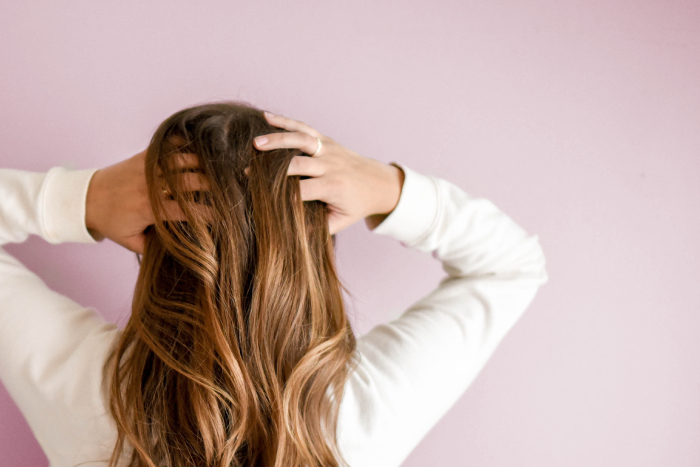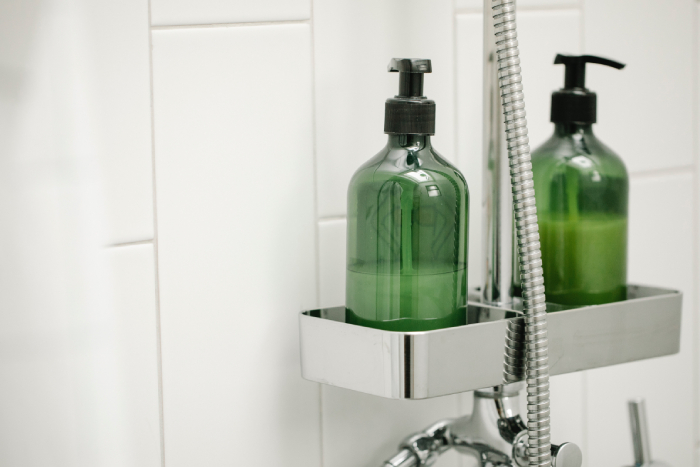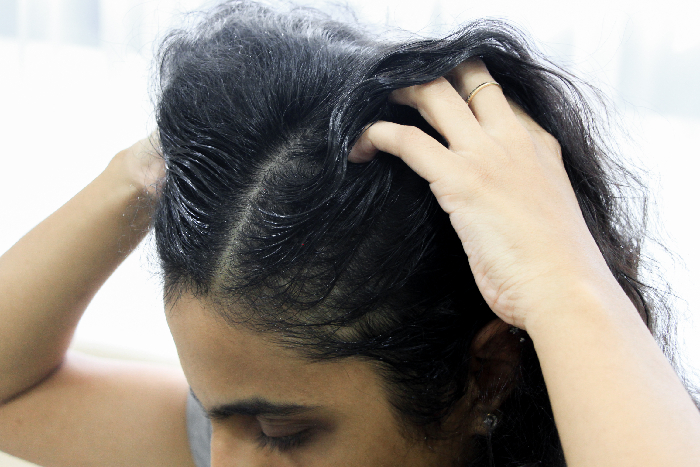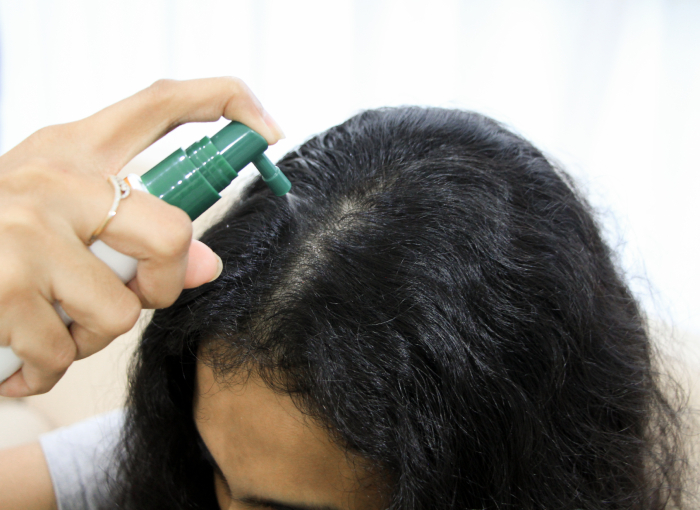It’s normal to get an itch on your scalp or notice dry pieces of skin flaking off when you scratch your head from time to time. But if you’re experiencing persistent itchiness and discomfort, don’t just brush it off because it might be a sign that you’re suffering from an inflamed scalp.
Inflammation isn’t just painful too; it can also lead to other hair and scalp problems like hair loss or even an infection at your roots. It’s why it’s best that you start paying attention to what’s really happening at your scalp, as well as make adjustments to your hair care routine or get the proper treatment you need.
Don’t panic just yet, because we share four ways to tell if you have scalp inflammation and what you can do about it, below!
Signs of scalp inflammation
1. Your scalp is red

Unless your scalp is having a major blush moment, redness is a sign that things aren’t looking quite right at your roots!
It could be that your scalp is irritated because you’re scrubbing at it too much in the shower, using hair products with harsh chemicals, or exposing it to the unrelenting afternoon sun. Regardless, a red and irritated scalp is a scalp that’s prone to inflammation.
Scalp redness could also point to surface-level skin conditions like psoriasis or seborrheic dermatitis.
Psoriasis is a skin disorder that causes thick, dry, and scaly patches to grow on the skin and, commonly, a red rash too. Since psoriasis is thought to be caused by problems with the immune system – skin cells are replaced at a much quicker rate than they should, it’s not a condition that can be treated.
On the other hand, seborrheic dermatitis is a common skin condition that’s revealed through itchiness and redness on the scalp as well as white or yellow scales. The skin is also often greasy and swollen, and you’ll notice the flakes on your hair too.
Even though both skin conditions can’t be treated, you can manage the symptoms – a red scalp included.
2. You’re noticing buildup on your scalp

Heavy hair products can lead to buildup on the scalp.
Scalp buildup might not be a sign of inflammation, but it’s surely one of the things that lead to an inflamed scalp!
If you’re not sure what buildup is, it’s this: an oily accumulation of the scalp’s natural sebum, hair product residue, dead skin cells, and sweat that ball up into flakes on the scalp. As it clogs up the hair follicles, scalp buildup can easily cause inflammation over time.
This type of inflammation is called folliculitis, and it happens when the follicles become inflamed or infected by bacteria; you’ll see tiny “pimples” around your hair’s roots, leading to itch and discomfort too.
Scalp buildup can even result in hair loss if the follicles become so clogged that they cannot deliver nutrients to the roots.
Thankfully, cleansing your scalp thoroughly using clarifying or anti-residue shampoos and gentle scalp scrubs goes a long way in helping you avoid nasty buildup.
3. Your scalp hurts and itches

Photo source: 8photo/Freepik
If your scalp hurts and itches, chances are there’s inflammation happening at the surface. An inflamed scalp can swell and press on the nerves in your skin, resulting in pain, itching, and overall discomfort.
Typically, you can manage the symptoms of pain and itching at home if you’re aware of what’s causing the inflammation. However, should you experience prolonged discomfort, it’s best that you visit the dermatologist to get your scalp checked.
4. You’re seeing flakes on your scalp

Photo source: Freepik
The “snow” on your shoulder could be pointing to much more than dandruff or a dry scalp, it could also be an indication that there’s inflammation happening underneath – such as in the case of seborrheic dermatitis.
The “flakes” from seborrheic dermatitis are usually large pieces of greasy and yellow scales that show up on the scalp and behind the ears, whereas, for dandruff, flakes are smaller and white.
Since a dry scalp can also cause flakiness on the scalp, it helps to recognise that dry flakes are even whiter and smaller compared to dandruff.
Once you’re clear about what’s causing your scalp to flake – inflammation from seborrheic dermatitis as opposed to dandruff or dry scalp, you’ll be able to better target and remedy the issue at hand (or should we say, head).
How to soothe your inflamed scalp
You should first evaluate the symptoms of your inflamed scalp (or have your scalp examined by a dermatologist) so that you can target the root cause.
Is the inflammation due to a skin condition like psoriasis or seborrheic dermatitis? Or, could it be due to external factors such as a harsh shampoo or a missing step in your haircare routine?

Should your scalp’s inflammation be due to a skin condition, a doctor may prescribe you topical creams, ointments, or medicated shampoos. To improve your condition, doctors might also recommend light therapy or prescribe oral medications.
However, if your scalp is irritated and inflamed because of what you’re doing (or not doing) in your routine, start making adjustments. Have you realised that your shampoo’s the problem? Swap it out for a formula that’s gentle and clarifying. Facing heavy buildup on your scalp? Add scalp scrubs or exfoliators to your routine.

Finally, over-the-counter products are a good choice to relieve symptoms like pain, itch, or flakiness on a daily basis. These formulas can, at the same time, nourish, soothe, and strengthen the scalp’s barrier so that you enjoy a comfier and healthier scalp day in and day out.
Soothe inflammation with this treatment essence

Bee Choo Origin might be known for its signature herbal scalp treatments at the salon, but the brand has also released take-home haircare products that’ll help you manage your scalp issues in-between appointments. When it comes to an inflamed scalp, Bee Choo Origin Scalp Treatment Essence is an over-the-counter product that’ll come to the rescue.

Packed with powerful ingredients like pumpkin seed extract and vitamins B3 and B6, the Scalp Treatment Essence is designed to reduce inflammation, redness, and itchiness all at once.
The calming blend also assists in the scalp’s renewal process and regulates sebum production, which means that you’ll enjoy a more balanced scalp in the long run too.
Review: Bee Choo Origin Scalp Treatment Essence

Daily Vanity’s team member Supraja struggles with scalp psoriasis, which makes her scalp feel itchy, red, and inflamed. She tried the Bee Choo Origin Scalp Treatment Essence every day for a week to give her verdict on whether it was effective as it promises for easing scalp inflammation.
“While psoriasis does not have a solution, I have to look for ways to deal with the symptoms it causes, like itching, redness, and discomfort. The only way I addressed this, previously, was by washing my hair a lot more frequently, which also led to hair loss.”
First impressions of the Scalp Treatment Essence

“When I picked up the Bee Choo Origin Scalp Treatment Essence, one of the first things I was very impressed with was the product’s easy-to-use nozzle and cap design. Not only did it make it easy to apply, but it was also easy for me to carry around in my bag without worrying about leakages.
Also, while most scalp products tend to have a strong and unpleasant smell, the Scalp Treatment Essence had a light and pleasant scent. I was able to apply the essence every day without feeling self-conscious about whether my hair smelt weird.”
Trying the Scalp Treatment Essence over a week

“During the week, I applied the Bee Choo Origin Scalp Treatment Essence on my clean scalp every night before bed. I carefully parted my hair, spritzed the essence on the areas of my scalp that were itchy or inflamed, and massaged the product in.
I immediately experienced a pleasantly cool sensation as well as a slight tingling sensation. However, the tingling only lasted for a couple of seconds and went away as I began to massage the product into my scalp.”
Verdict on the Scalp Treatment Essence
“After one week of use, I have to say that I am impressed with the Scalp Treatment Essence!
This is the first over-the-counter, non-medicated scalp product I have tried to help with my psoriasis symptoms. Surprisingly, I experienced a significant reduction in itchiness and flakiness on my scalp.

Supraja’s scalp was less itchy and flaky after one week.
Since the Scalp Treatment Essence helped to reduce my scalp’s itchiness throughout the day, it also protected my scalp from extra irritation and damage that happens when I scratch. My scalp is also much more comfortable and less red than before.
As it is a leave-in formula, I was also able to apply it directly to my scalp without needing to rinse it off after. This meant that I could use the product even on the days when I skip washing my hair, preventing scalp dryness that comes with overwashing.
I could also address my scalp concerns without worrying about how the formula might affect my naturally dry and frizzy hair!
As the essence was easy to add to my routine without much extra trouble, I was encouraged to keep using it every day. This is especially important to me because the harder it is to use the product, the less motivation I have to continue using it.
Even though it may not be a doctor’s treatment for psoriasis, the essence is a good option to relieve some symptoms, especially for those who prefer using lightweight products with a subtle rather than pungent scent.”
Soothe an inflamed scalp with the Bee Choo Origin Scalp Treatment Essence!
Shop hereBee Choo Origin Scalp Treatment Essence retails for S$32 on Bee Choo Origin’s website or at any Bee Choo Origin outlet.
This article is brought to you by Bee Choo Origin.


